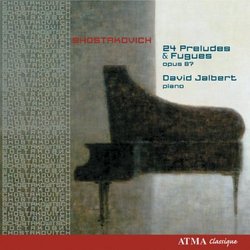| All Artists: D. Shostakovich, David Jalbert Title: Shostakovich: 24 Preludes & Fugues Op 87 Members Wishing: 0 Total Copies: 0 Label: ATMA Original Release Date: 1/1/2008 Re-Release Date: 3/25/2008 Genre: Classical Styles: Chamber Music, Historical Periods, Classical (c.1770-1830) Number of Discs: 2 SwapaCD Credits: 2 UPC: 722056255523 |
Search - D. Shostakovich, David Jalbert :: Shostakovich: 24 Preludes & Fugues Op 87
 | D. Shostakovich, David Jalbert Shostakovich: 24 Preludes & Fugues Op 87 Genre: Classical
|
Larger Image |
CD Details |
CD ReviewsThis New Recording of the Shostakovich Op. 87 Joins the Best J Scott Morrison | Middlebury VT, USA | 03/27/2008 (5 out of 5 stars) "Shostakovich was a lifelong lover of Bach; indeed, he made it a habit to play one or the other of the preludes and fugues from the Well-Tempered Clavier every day. His music often makes use of Bachian counterpoint and forms. In the early 1930s, right after he'd completed the opera, Lady Macbeth of Mtsensk, he wrote a set of preludes (Op. 34) whose key structure mimics that of the WTC. He had a particular fondness for the Bachian passacaglia (or chaconne), possibly the most famous of which is the one that concludes the First Violin Concerto.
To tell the truth I've never heard a bad recording of Shostakovich's 24 Preludes and Fugues, Op. 87. The set was written in the early 1950s for the young Tatiana Nikolayevna, the winner of the first International Bach Competition in Leipzig at which Shostakovich had been a judge. She recorded it several times. Subsequent marvelous recordings have been done by Vladimir Ashkenazy, Konstantin Scherbakov and Keith Jarrett (!) among others. And there is a great recording of excerpts from the set by Sviatoslav Richter. Now comes this set by young Montréal pianist David Jalbert. From the pianists' grapevine I'd heard good things about it even before it was officially issued. (Pianists have a way of hearing about exceptional recordings before they are in general release.) So it was with eagerness (and a modicum of scepticism -- it's my nature) I cracked open the shrink wrap on the set and sat down to listen. It didn't take me long to realize that I was hearing a stunning performance. On the whole Jalbert's reading falls in the quietly intense camp. He never shouts -- and there are some who might wish he did at times -- but whatever he plays has intensity allied with confident serenity in which there is considerable nuance. I'd never heard of Jalbert before but I find myself wanting to look up what else he may have recorded, and since I live only a couple of hours from Montréal, perhaps getting a chance to hear him in live performance. It would be hard to choose favorite performances within the forty-eight separate pieces included in the set, but I was particularly struck by Preludes Nos. 2, 13 and 20, and Fugues Nos. 13 (in five voices, all brought out limpidly), 15, and the great double fugue, No. 24. Jalbert's piano is expertly tuned, voiced and regulated and he is given marvelous sound by the recording engineers. All in all, this is a recording to treasure. Scott Morrison" |

 Track Listings (24) - Disc #1
Track Listings (24) - Disc #1